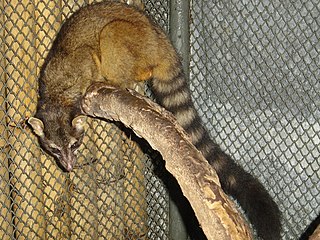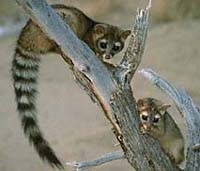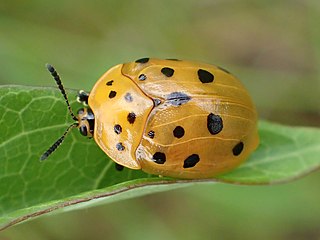
Spearmint, also known as garden mint, common mint, lamb mint and mackerel mint, is native to Europe and southern temperate Asia, extending from Ireland in the west to southern China in the east. It is naturalized in many other temperate parts of the world, including northern and southern Africa, North America, and South America. It is used as a flavouring in food and herbal teas. The aromatic oil, called oil of spearmint, is also used as a flavoring and sometimes as a scent.

Herring are various species of forage fish, mostly belonging to the family of Clupeidae.

The ringtail is a mammal of the raccoon family native to arid regions of North America. It is widely distributed and well-adapted to its distributed areas. It has been legally trapped for its fur. It is listed as Least Concern on the IUCN Red List. The species is known by a variety of different names, such as ring-tailed cat, miner's cat, civet cat, and cacomistle, though the last of these can refer to B. sumichrasti.

Procyonidae is a New World family of the order Carnivora. It includes the raccoons, ringtails, cacomistles, coatis, kinkajous, olingos, and olinguitos. Procyonids inhabit a wide range of environments and are generally omnivorous.

The cacomistle, also spelled cacomixtle, is a primarily nocturnal, arboreal, omnivorous member of the carnivoran family Procyonidae. Depending on the location, its preferred habitats are humid and tropical evergreen jungle and montane cloud forests; seasonally, it may venture into drier, deciduous forests.

Bassariscus is a genus in the family Procyonidae. There are two extant species in the genus: the ringtail or ring-tailed cat and the cacomistle. Genetic studies have indicated that the closest relatives of Bassariscus are raccoons, from which they diverged about 10 million years ago in the Tortonian Age of the Miocene. The two lineages of Bassariscus are thought to have separated after only another two million years, making it the extant procyonid genus with the earliest diversification. Later diversification in the genus in the Pliocene and Pleistocene saw the emergence of two extinct species, Bassariscus casei and Bassariscus sonoitensis, respectively. Due to the more digitigrade stance of their legs compared to the plantigrade stance of other members of Procyonidae, some taxonomies place the genus as a separate family, Bassaricidae.. The name is a Greek word for fox ("bassaris") with a Latinized diminutive ending ("-iscus"). The genus was named by Elliott Coues in 1887, having previously been described by Lichtenstein in 1830 under the name Bassaris. Coues proposed the word "bassarisk" as the English term for animals in this genus. Its habitat includes semi-arid areas in the southwestern United States, the whole of Mexico, as well as moist tropical forests in Central America.

Caniformia is a suborder within the order Carnivora consisting of "dog-like" carnivorans. They include dogs, bears, raccoons, and mustelids. The Pinnipedia are also assigned to this group. The center of diversification for the Caniformia is North America and northern Eurasia. Caniformia stands in contrast to the other suborder of Carnivora, the Feliformia, the center of diversification of which was in Africa and southern Asia.

Imperata cylindrica is a species of perennial rhizomatous grass native to tropical and subtropical Asia, Micronesia, Melanesia, Australia, Africa, and Southern Europe. It has also been introduced to Latin America, the Caribbean, and the Southeastern United States. It is a highly flammable pyrophyte, and can spread rapidly by colonizing disturbed areas and encouraging more frequent wildfires.

Enicocephalidae, also called unique-headed bugs and gnat bugs, are a family of around 300 species of the suborder Heteroptera. They are typically 4 mm (0.16 in) long, and found throughout the world. They have an elongated head, constricted in places, hence their head is 'unique'.

The Encyclopedia of Life (EOL) is a free, online encyclopedia intended to document all of the 1.9 million living species known to science. It aggregates content to form "pages" for every known species. Content is compiled from existing trusted databases which are curated by experts and it calls on the assistance of non-experts throughout the world. It includes video, sound, images, graphics, information on characteristics, as well as text. In addition, the Encyclopedia incorporates species-related content from the Biodiversity Heritage Library, which digitizes millions of pages of printed literature from the world's major natural history libraries. The BHL digital content is indexed with the names of organisms using taxonomic indexing software developed by the Global Names project. The EOL project was initially backed by a US$50 million funding commitment, led by the MacArthur Foundation and the Sloan Foundation, who provided US$20 million and US$5 million, respectively. The additional US$25 million came from five cornerstone institutions—the Field Museum, Harvard University, the Marine Biological Laboratory, the Missouri Botanical Garden, and the Smithsonian Institution. The project was initially led by Jim Edwards and the development team by David Patterson. Today, participating institutions and individual donors continue to support EOL through financial contributions.

Genetic pollution is a term for uncontrolled gene flow into wild populations. It is defined as "the dispersal of contaminated altered genes from genetically engineered organisms to natural organisms, esp. by cross-pollination", but has come to be used in some broader ways. It is related to the population genetics concept of gene flow, and genetic rescue, which is genetic material intentionally introduced to increase the fitness of a population. It is called genetic pollution when it negatively impacts the fitness of a population, such as through outbreeding depression and the introduction of unwanted phenotypes which can lead to extinction.
Elipsocidae is a family of Psocodea belonging to the infraorder Homilopsocidea. Members of the family have a free areola postica. Many species are apterous. The family includes about 130 species in more than 30 genera.

Kateretidae also known as short-winged flower beetles are a family of beetles in the superfamily Cucujoidea. There are 10 extant and 4 extinct genera, and at least 40 described species. They are found worldwide except in New Zealand. Adults are anthophagous, feeding on flowers, while the larvae are spermatophagous inside the flower corolla.

Salpingidae or narrow-waisted bark beetles is a family of beetles in the superfamily Tenebrionoidea. The species are small, about 1.5 – 7 mm in length. The family is globally distributed and consists of about 45 genera and 300 species, which are generally found in the temperate regions of both hemispheres. The family is mainly associated with plants as well as with ascomycete and hyphomycete fungi. Some members of the family are associated with unusual habitats, like Aegialites and Antarcticodomus, which are found in coastal areas including the intertidal zone, with former feeding on algae.

iNaturalist is an American 501(c)(3) nonprofit social network of naturalists, citizen scientists, and biologists built on the concept of mapping and sharing observations of biodiversity across the globe. iNaturalist may be accessed via its website or from its mobile applications. iNaturalist includes an automated species identification tool, and users further assist each other in identifying organisms from photographs and even sound recordings. As of 9 July 2024, iNaturalist users had contributed approximately 197,660,888 observations of plants, animals, fungi, and other organisms worldwide, and 290,007 users were active in the previous 30 days.

Chelymorpha cassidea, known generally as the Argus tortoise beetle or milkweed tortoise beetle, is a species of leaf beetle in the family Chrysomelidae. It is found in the Caribbean and North America.
Negasilus is a genus of robber flies in the family Asilidae. There are about five described species in Negasilus.
Animal Ethics is a nonprofit organization formed to promote discussion and debate around issues in animal ethics and to provide information and resources for animal advocates. They also do outreach work in several countries on the issue of speciesism. Their aim is to create a world where moral consideration is extended to all sentient beings. The organization's website covers topics such as speciesism, sentience, veganism and wild animal suffering and has content translated into several languages.















